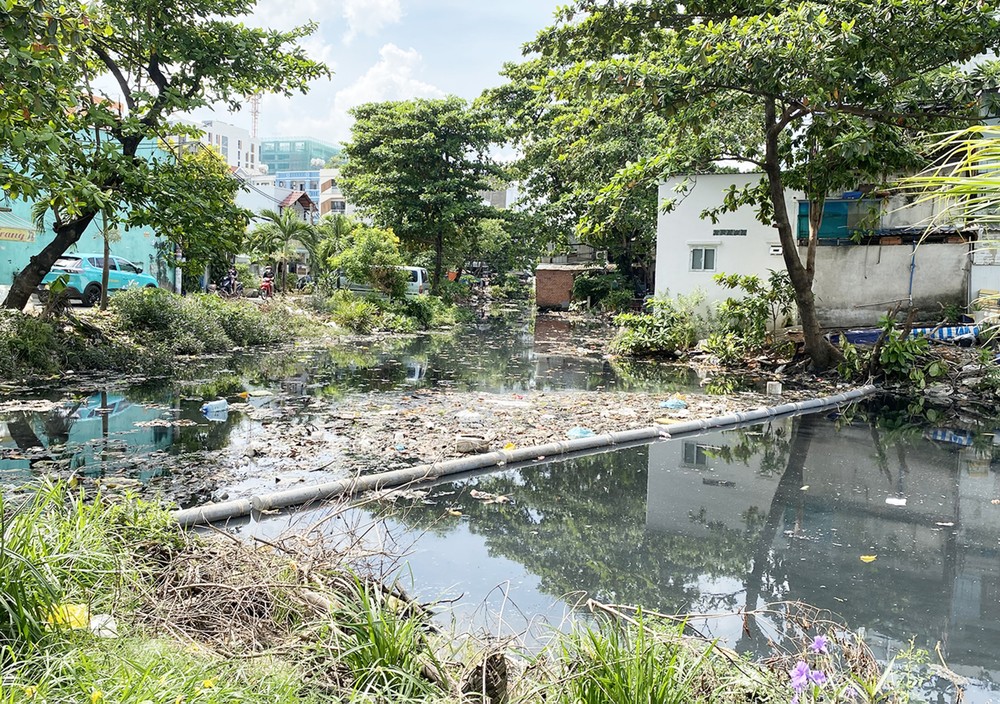
Many canals in the inner city such as Xuyen Tam canal in Binh Thanh District, Tau Hu canal and Doi canal in District 8, A41 canal in Tan Binh District, Chin Xieng canal in Go Vap District are currently black due to pollution from garbage and domestic wastewater.
Polluted canals not only affect the living environment but they are also an ideal condition for mosquitoes to breed and develop, with a high risk of dengue outbreaks in this area. People living around these canals said that recently, local authorities and volunteers have regularly organized garbage collection campaigns and installed trash barriers, but after a short time, garbage continued to appear densely.
The water environment along Xuyen Tam canal in Binh Thanh District is seriously polluted with piles of garbage on both sides of the banks, the water is pitch black, and the stench is strong. Residents of houses on the canal-side road have moaned about the matter.
Tran Huu Canh, who resides in close proximity to the canal, expressed that during the current rainy season, there has been a noticeable increase in the mosquito population. According to him, local residents in this area have been enduring trash, foul sewage, and insects like mosquitoes for many years.
Worse, his neighbors were hospitalized due to dengue infection. At night, almost every family has to close their doors and use mosquito nets to prevent dengue bites.
The pollution level at Chin Xieng canal in Ward 5 of Go Vap District is equally severe.
Many kinds of household waste are visible on the surface of the canal, with various types of litter, bottles, and debris lining both banks. The canal experiences minimal water flow, leading to the accumulation and stagnation of domestic wastewater and rainwater, which emits an unpleasant odor.
Tran Van An, a resident near Chin Xieng canal, moaned that the canal is overwhelmed with trash, the water is contaminated, and the flow is nearly obstructed, resulting in a persistent foul smell that disrupts the lives of those living nearby. Recently, there has been a significant increase in flies and mosquitoes due to the humid conditions and unpredictable weather. Therefore, he expected the local authorities to take prompt action for renovation and cleaning the canal to improve the living environment.
Amid the onset of rainy season, the environment is hot and humid which favors dengue virus propagation in the mosquito in stagnant water, canals, landfills. It is one of the contributing factors to the occurrence of dengue outbreaks.
According to information from the Ho Chi Minh City Center for Disease Control (HCDC), from August 19 to August 25, the southern largest city recorded 301 more cases of dengue fever, 3.7 percent higher than the average of the previous 4 weeks. The total number of dengue fever cases in Ho Chi Minh City accumulated from the beginning of 2024 to week 34 is 6,091 cases.
Doctor Tran Thi Van Anh, the Head of the Internal Medicine Department at Thong Nhat Hospital, stated that certain patients with dengue fever were admitted for treatment later than necessary due to psychological factors, resulting in a swift deterioration and escalation of their condition.
Dr. Phan Nguyen Lien Anh from Children's Hospital 1 in HCMC disclosed that currently the number of inpatient dengue fever cases at the hospital is fluctuating at 30-35 cases including about 40 outpatient cases per day. Worse, two of them have been requiring intensive care due to their poor health condition. Dengue fever has a high risk of complications and can affect the patient's life if not treated promptly.
She emphasized the importance of promptly taking patients exhibiting suspicious symptoms to the hospital for evaluation so that physicians will have an appropriate treatment plan. At present, there is no specific medication for dengue fever; the primary approach involves managing symptoms to prevent the condition from worsening and becoming life-threatening. Patients must adhere to the doctor's prescribed regimen and guidelines.
Dr. Le Huu Cuong, Deputy Head of the Disease Control Department at the Go Vap District Medical Center, reported that since the beginning of July, there have been 122 confirmed cases of dengue fever in the district, with seven outbreaks noted, reflecting a decrease of over 35 percent compared to the same time frame last year.
In response to the dengue fever outbreak, the medical center has collaborated with local authorities to implement various epidemic prevention strategies. These include educating the community on maintaining a clean living environment and conducting insecticide spraying in high-risk and outbreak areas.
Additionally, medical workers from the center visit 16 ward health stations daily to monitor the epidemic situation and investigate cases to ensure timely treatment.
























